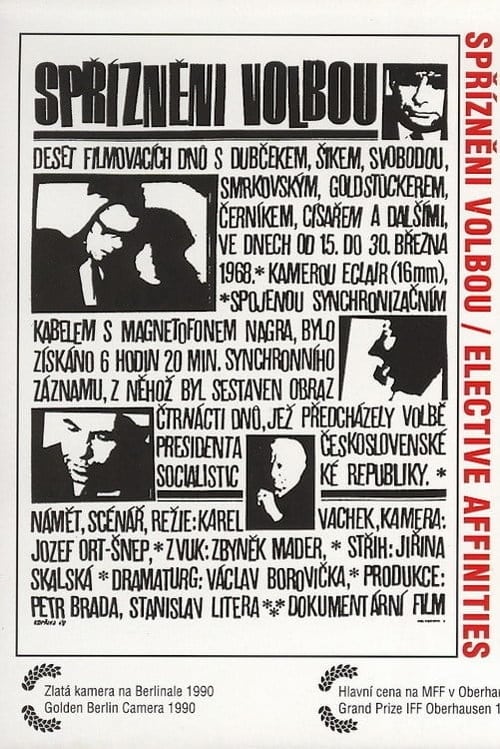Movies by Karel Vachek

Communism and the Net, or the End of Representative Democracy
The six-hour essay in four parts examines the history of regimes and revolutions, leaders and martyrs, from a philosophical perspective. The collage of personal memories, staged scenes and archives of collective memory compares the Prague Spring to the Velvet Revolution and shows the exposure, conflict, crisis, and catharsis of the post-communist society.

Moravian Hellas
Karel Vachek’s graduate film offers us a documentary essay which is both a light-hearted and aggressive little piece and also a parody of investigative film journalism. The Strážnice folk festival, backed by the cultural Party apparatus of the time, for years had little to commend itself to authentic folklore. In the film the event assumes the form of a bizarre stage spectacle with almost surrealistic elements that Vachek reinforces with unconventional approaches (commentary appearing as titles on screen, singing, declamations into the camer...

Elective Affinities
Documentary showing the Czechoslovakian political landscape in March 1968, when president Antonin Novotny, a hardline Stalinist, stepped down and moderate communist Ludvik Svoboda was elected. Five months later, in August 68, the Prague Spring would end with the military intervention of the Warsaw Pact.

New Hyperion or Liberty, Equality, Brotherhood
From the behavior, discourse, and appearance of individual actors, Vachek composes, in the form of a mosaic, a broad and many-layered film-argument about Czechoslovak democracy in the period of its rebirth, all administered with the director’s inimitable point of view.

Who Will Watch the Watchman? Dalibor, or the Key to Uncle Tom's Cabin
In the fourth and final instalment of Karel Vachek’s not-so-little Little Capitalist Tetralogy, preparations for an opera performance in the Czech capital’s art-nouveau National Theatre become the occasion for a reflection on rebels, dissidents, and others subversives who stand in battle, heroically and sometimes tragically, against majority opinion, established rules, or powerful institutions. "As the camera wanders over, around and through Prague’s lavish National Theatre, director J.A. Pitínský coaches singers through a rehearsal of Bedři...

Bohemia Docta or the Labyrinth of the World and the Lust-House of the Heart (A Divine Comedy)
A labyrinthine portrait of Czech culture on the brink of a new millennium. Egon Bondy prophesies a capitalist inferno, Jim Čert admits to collaborating with the secret police, Jaroslav Foglar can’t find a bottle-opener, and Ivan Diviš makes observations about his own funeral. This is the Czech Republic in the late 90s, as detailed in Karel Vachek’s documentary.

What Is to Be Done? A Journey from Prague to Ceský Krumlov, or How I Formed a New Government
Quite a few years have passed since November 1989. Czechoslovakia has been divided up and, in the Czech Republic, Václav Klaus’s right-wing government is in power. Karel Vachek follows on from his film New Hyperion, thus continuing his series of comprehensive film documentaries in which he maps out Czech society and its real and imagined elites in his own unique way.

Záviš, kníže pornofolku pod vlivem Griffithovy Intolerance a Tatiho Prázdnin pana Hulota aneb Vznik a zánik Československa (1918 - 1992)
A dog's funeral becomes part of a chain of absurd events including a tomato ketchup battle, a reconstruction of the battle of Austerlitz and a motorbike show. Its common denominator is the commercial interest of sponsors and big business, the ambivalent winners of privatization and participants of numerous corruption affairs. Vachek debates corruption and environmental disaster, but insists that there is an alternative. Against the mass of "pseudoevents" is the independent techno-party CzechTekk, raided by the police despite the fact that it...

Malíř Kamil Lhoták
A poetic documentary portrait about czechoslovakian painter.

Stoletá voda
Documentary about dam rupture.

Obscurantist and His Lineage or The Pyramids' Tearful Valley
Karel Vachek’s latest documentary essay deals with the fine line between an internal belief in God and institutionalized religion. At the same time it brings up the need for a healthy sense of skepticism and the benefit of not believing in anything that advertises itself as certain. The filmmaker sets out for the USA, Japan, Great Britain, Poland, and the Balkans in his sometimes amusing investigation of spiritual substitutes, such as esoteric "teachings” or various fraudulent and magical practices, to which we sometimes fall prey due to our...